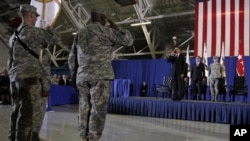The U.S.-led war in Iraq is officially over, marked by a solemn and symbolic ceremony at a military post just outside Washington.
U.S. President Barack Obama and other top officials welcomed home the top U.S. commander in Iraq, General Loyd Austin, along with the flag representing U.S. forces in Iraq.
President Obama was not expected to make any remarks.
U.S. Joint Chiefs of Staff Chairman General Martin Dempsey thanked the troops and their families for their service and sacrifice. And Deputy Defense Secretary Ashton Carter said their almost nine-year-long effort had given the Iraqi people a "new dawn."
The last convoy of U.S. soldiers left Iraq Sunday, ending a war that ousted Iraqi dictator Saddam Hussein and left a fragile democracy still facing insurgents and sectarian divisions.
The withdrawal ended a war that cost the lives of almost 4,500 U.S. troops, tens of thousands of Iraqis, and hundreds of billions of dollars of U.S. government funds.
Several hundred U.S. security personnel remain in Iraq at the U.S. embassy in Baghdad.
The quiet withdrawal was a sharp contrast to the start of the war in March 2003, when U.S.-led forces launched airstrikes over Baghdad as part of what they called a "shock and awe" campaign against Saddam. U.S. and allied ground forces then stormed from Kuwait into Iraq, toppling the minority Sunni dictator of a Shi'ite majority nation within weeks and capturing him by the end of the year.
Saddam's fall sparked a Sunni insurgency that evolved into a brutal sectarian conflict between Iraq's Shi'ite and Sunni communities, with violence peaking in 2006. The scale of sectarian and insurgent attacks declined significantly after 2007, when the United States sent a surge of troops to Iraq and Sunni tribal militias sided with U.S. forces against Sunni al-Qaida militants.
At the height of the war, more than 170,000 U.S. troops were stationed in Iraq at more than 500 bases. The United States promised to withdraw them by the end of 2011 under a 2008 U.S.-Iraqi agreement signed by the administration of former U.S. President George W. Bush and implemented by current President Barack Obama.
In a television interview recorded Thursday with U.S. network ABC News, President Obama said the U.S. troop presence in Iraq "succeeded" in giving Iraqis a chance to build a successful future. Mr. Obama opposed the war when he ran for office and vowed to end it. Opinion polls have showed a majority of Americans believe the war went on too long.
Some information for this report provided by AP.
US Iraq Forces Home For Good




